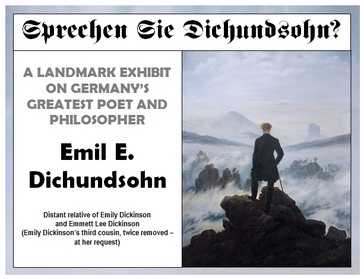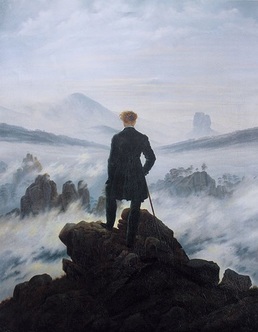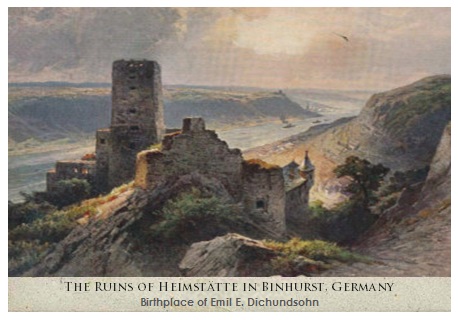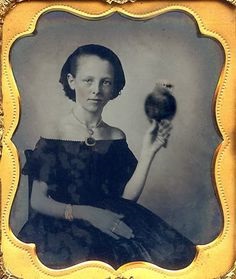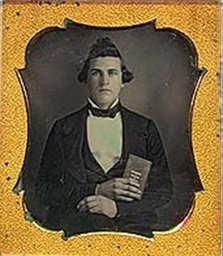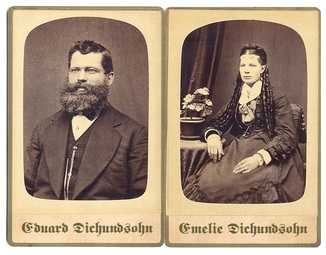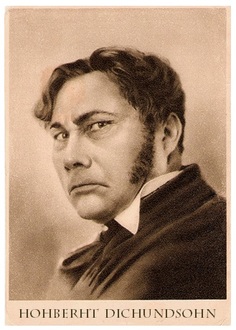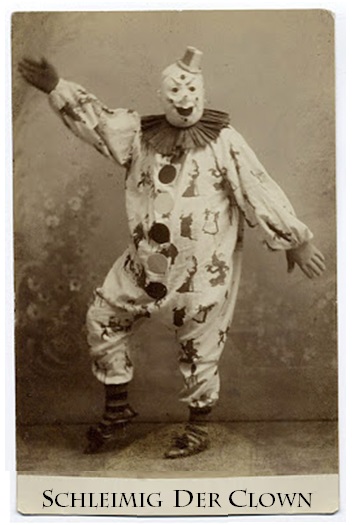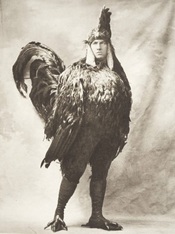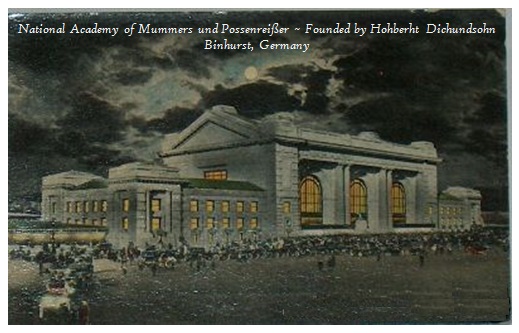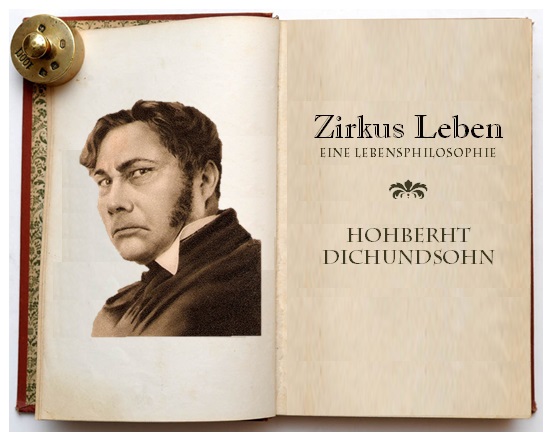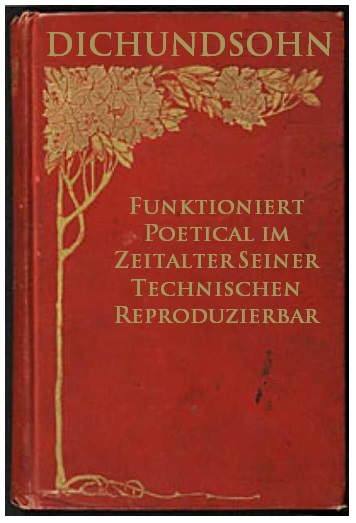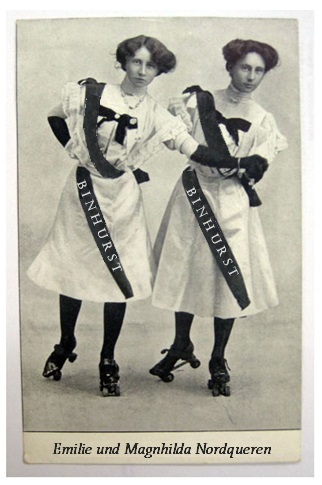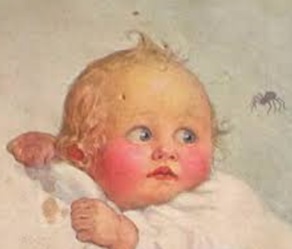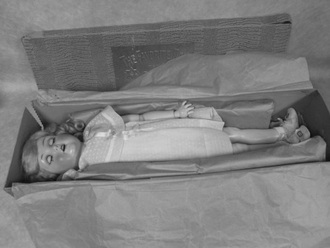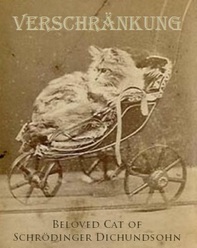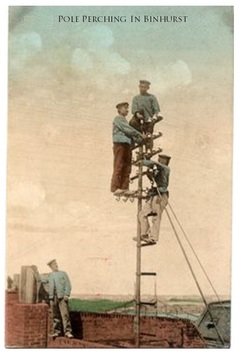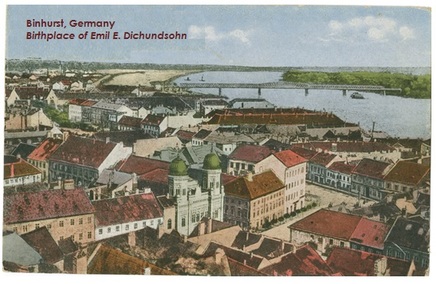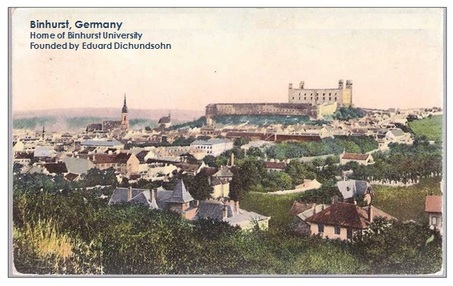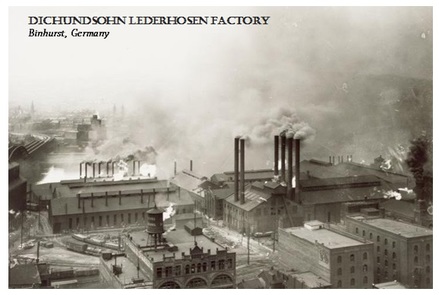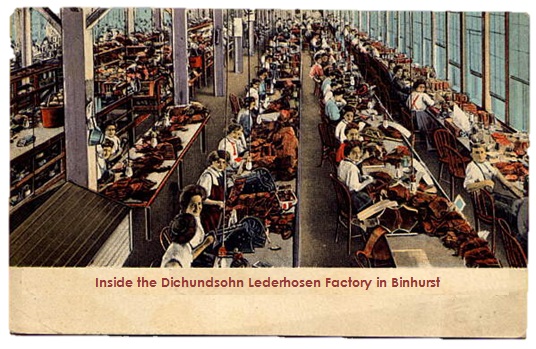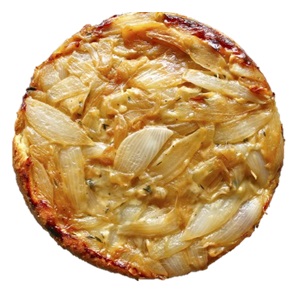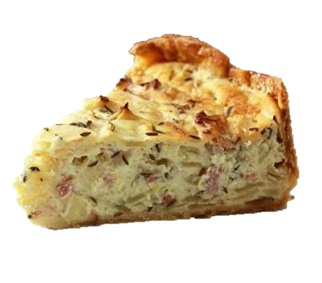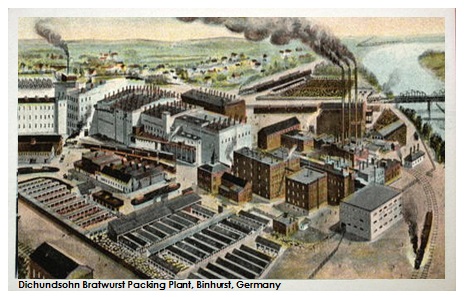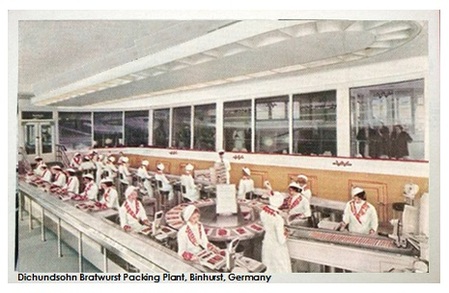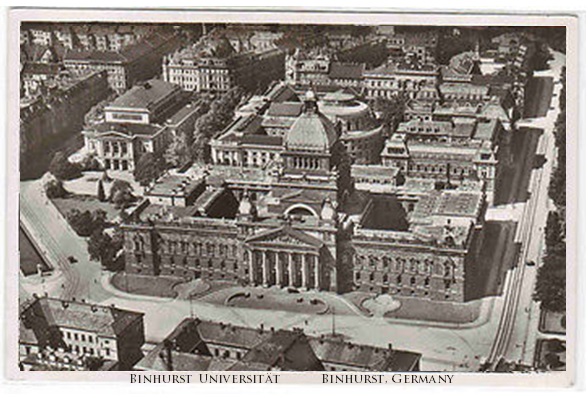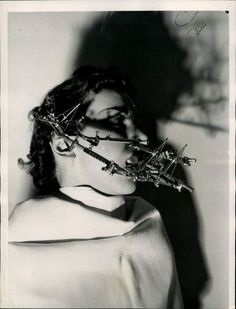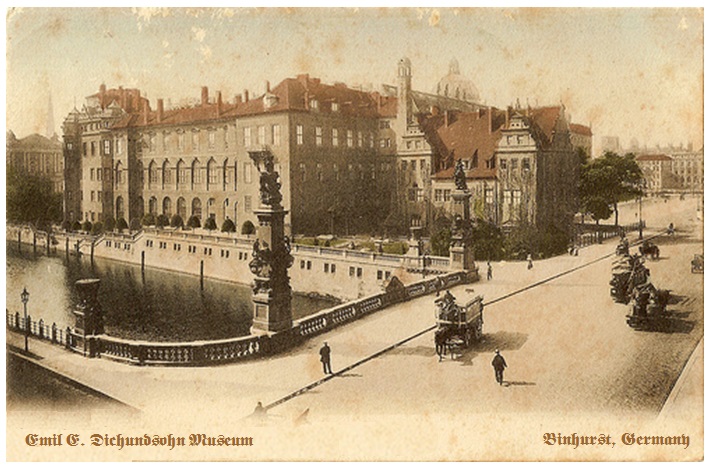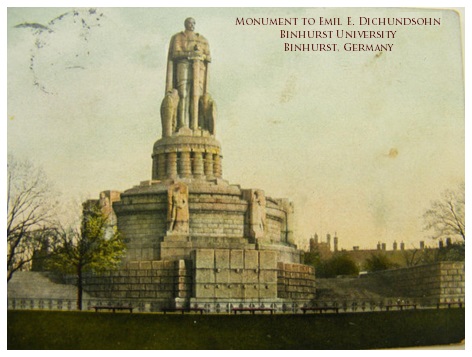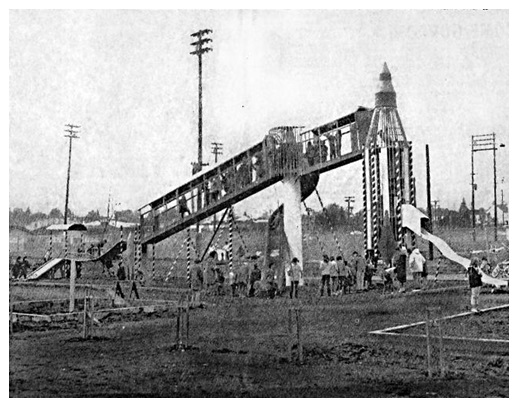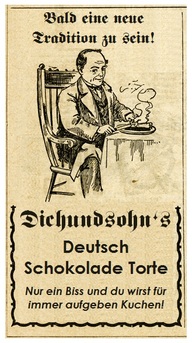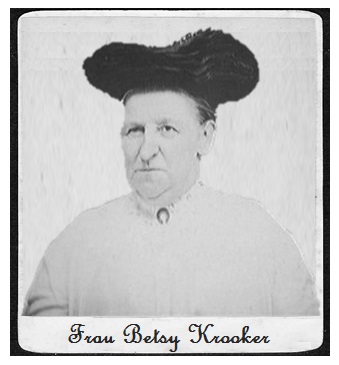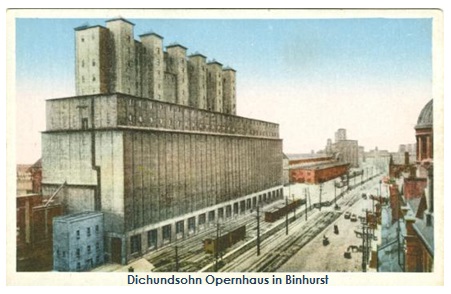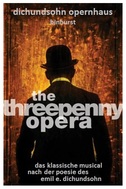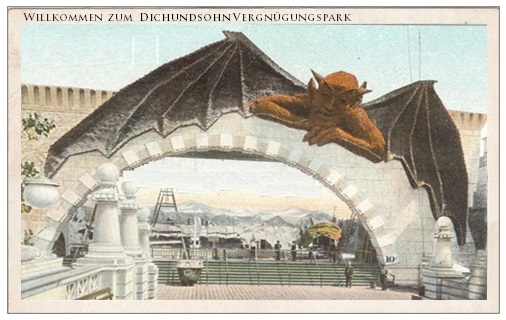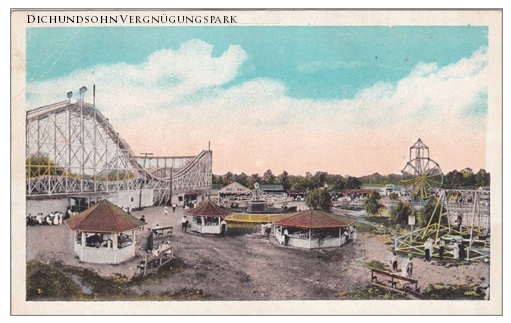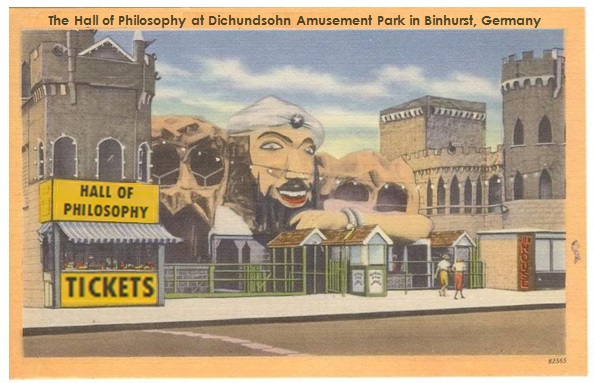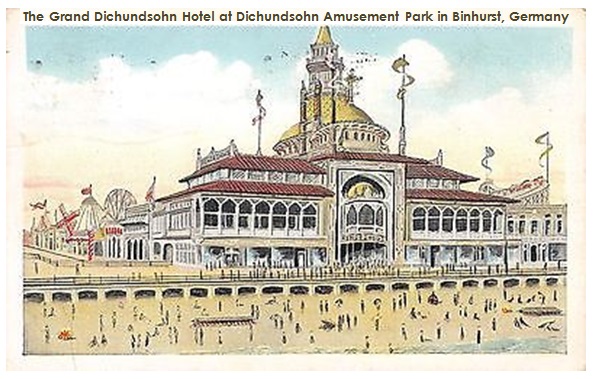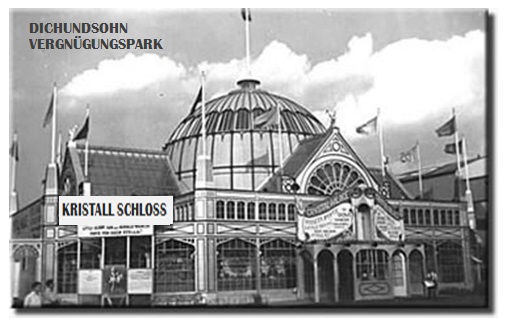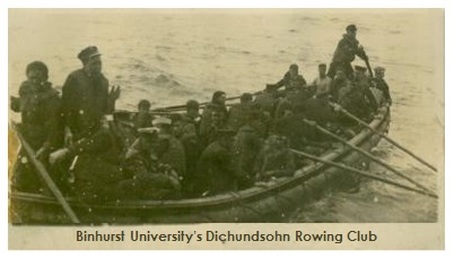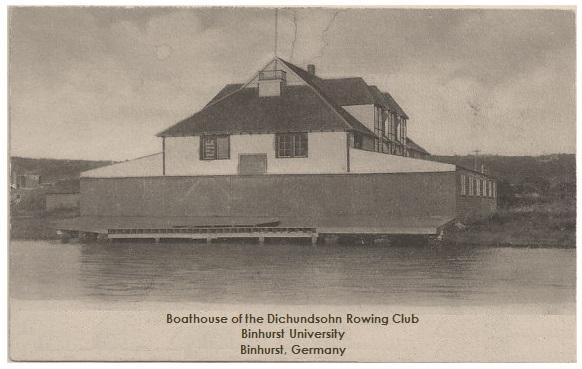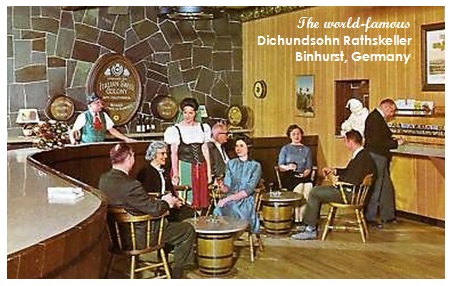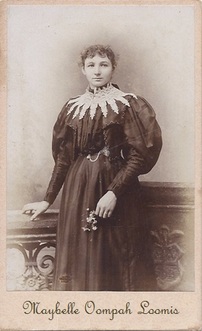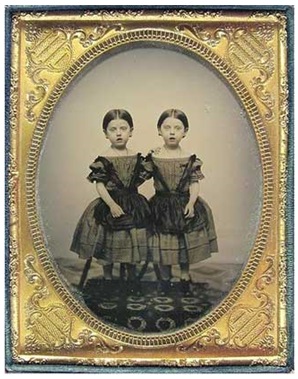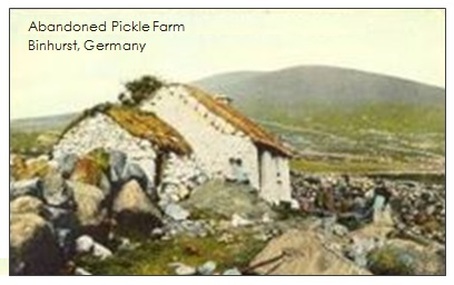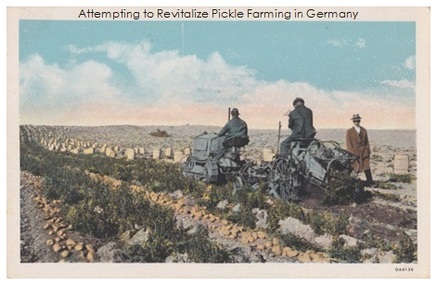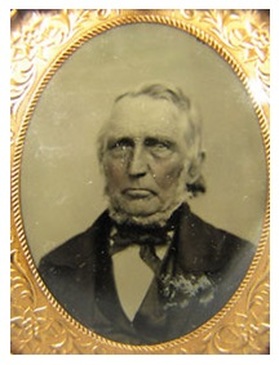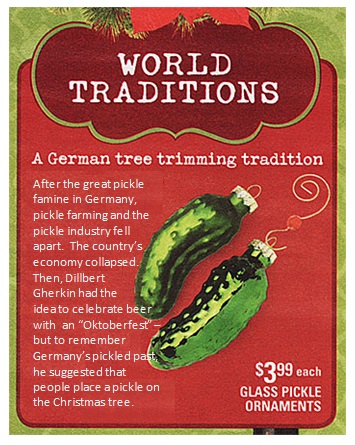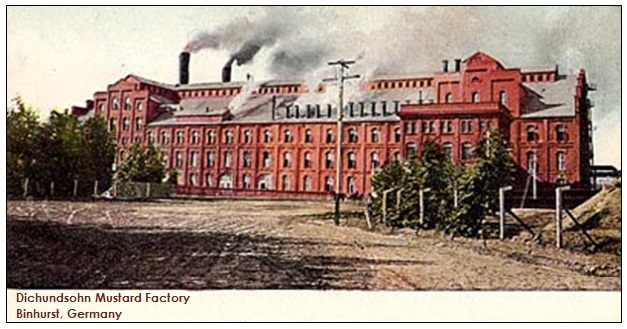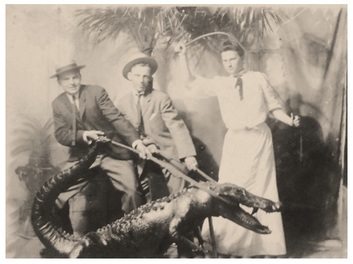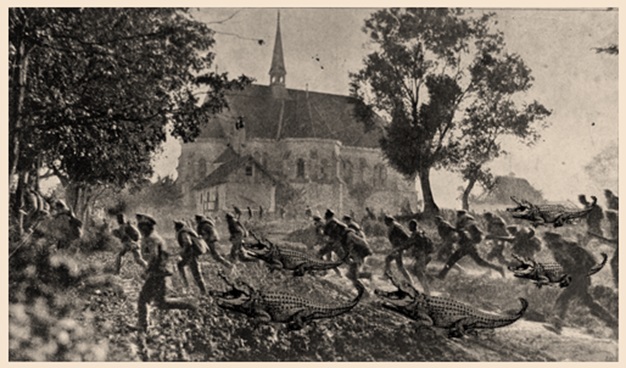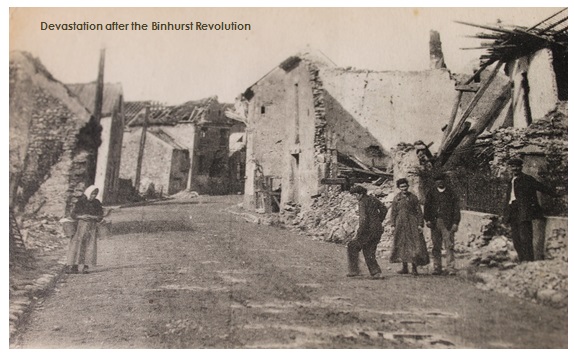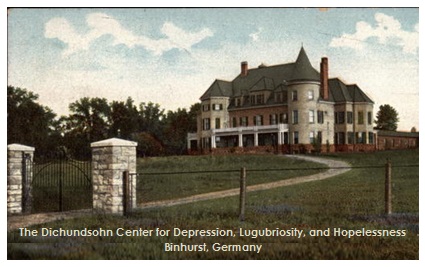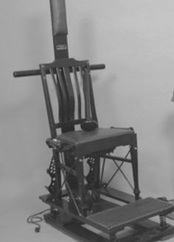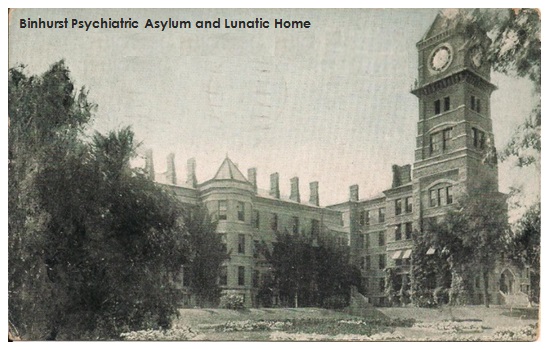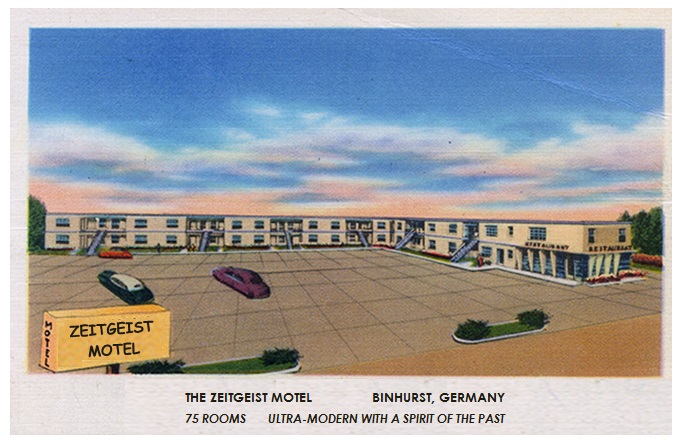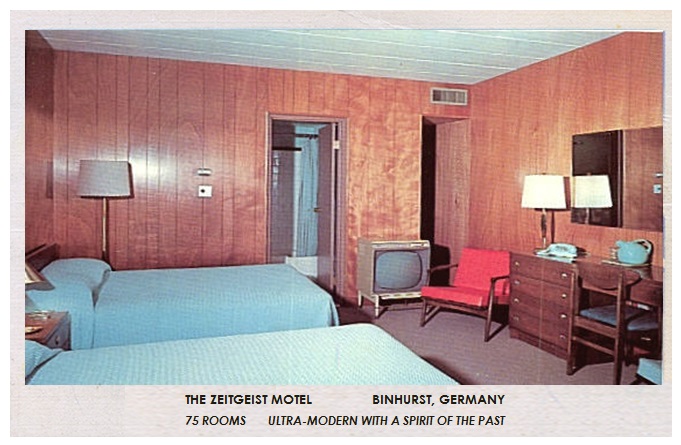MAY 2015: |
Sprechen Sie Dichundsohn? |
May 1
Emil E. Dichundsohn was the ninth son of Eduard Dichundsohn and Emelie Nordqueren Dichunsohn. He is known as the greatest German poet and the father of all German philosophy. His father was a distant relative of Edward Dickinson, the father of Emily Dickinson.
Emil E. Dichundsohn was born and lived at Heimstätte in Binhurst, Germany. The ruins of Heimstätte are one of the top tourist attractions in Germany.
Emil E. Dichundsohn was born and lived at Heimstätte in Binhurst, Germany. The ruins of Heimstätte are one of the top tourist attractions in Germany.
|
Pictured below: This painting of Emil E. Dichundsohn by Caspar David Friedrich hangs in the Emil E. Dichundsohn Museum in Binhurst.
|
Pictured below: The ruins of Heimstätte, the birthplace and home of Emil E. Dichunsohn
(a distant relative of both Emily Dickinson and Emmett Lee Dickinson) in Binhurst, are one of the top tourist attractions in Germany. |
|
Below: One of the most famous poems by Emil E. Dichundsohn, the Father of all German Philosophy:
I lost a World – the other day!
Has anybody found? Yet – to my frugal Eye I realize that no problem can be solved from the same level of consciousness that created it So Sir – do not bother to find it – for me! For once we accept our limits – we go beyond them. |
Below: Dichundsohn's poem inspired Emily Dickinson to pen this poem:
I lost a World -
the other day!
Has Anybody found? You'll know it by the Row of Stars Around its forehead bound. A Rich man – might not notice it – Yet – to my frugal Eye, Of more Esteem than Ducats – Oh find it – Sir – for me! |
May 2
Who was Emil E. Dichundsohn? The son of Eduard and Emelie Dichundsohn, Emil E. Dichundsohn is Germany's greatest and most admired poet, philosopher and cultural critc. He was an eclectic thinker who combined elements of German idealism, Romanticism, historical materialism and Western aesthetics in his works.
He earned his doctoral degree cum laude from Binhurst University (founded by his father) with the dissertation Begriff der Kunstkritik in der Deutschen Romantik (The Concept of Criticism in German Romanticism). His first published volume was Funktioniert Poetical im Zeitalter Seiner Technischen Reproduzierbarkeit (Works Poetical in the Age of Mechanical Reproduction).
He earned his doctoral degree cum laude from Binhurst University (founded by his father) with the dissertation Begriff der Kunstkritik in der Deutschen Romantik (The Concept of Criticism in German Romanticism). His first published volume was Funktioniert Poetical im Zeitalter Seiner Technischen Reproduzierbarkeit (Works Poetical in the Age of Mechanical Reproduction).
|
Below: Many of Dichundsohn's poems examined, probed, and even doubted one's identity and individuality. One of his most famous is "I am nobody":
I
am nobody
For society does not consist of individuals but expresses the sum of interrelations, The relations within which these individuals stand. Who are you? How dreary – to be – Somebody! How public – like a Frog – From each according to his abilities, To each according to his needs. |
Below: Dichundsohn's poem inspired Emily Dickinson to pen this poem:
I'm nobody! Who are you?
Are you nobody, too? Then there's a pair of us—don't tell! They'd banish us, you know. How dreary to be somebody! How public, like a frog To tell your name the livelong day To an admiring bog! |
May 3
|
Emil E. Dichundsohn's Uncle Hohberht was an acclaimed party clown and a world-renowned philosopher. Hohberht Dichundsohn established the "Zirkus Leben" School of Philosophy which views life as alternating states of controlled chaos and ungoverned order.
Hohberht was also a distinguished party clown, Schleimig Der Clown, and he founded Germany's National Academy of Mummers und Possenreißer. Pictured at the right: Hohberht Dichundsohn, uncle to Germany's greatest poet and philosopher Emil E. Dichundsohn. Pictured at the far right: Hohberht Dichundsohn as Schleimig Der Clown. |
|
Below: Hohberht Dichundsohn's Ode to Clowning:
Wenn ich ein Kind Lachen starten
Ich werde nicht umsonst Clown ; Wenn ich scherzen und erhöhen den Sparren Oder reißen eigenen Kette , Oder spritzen einige funkelnde Selters Zu der Menge wieder Ich werde nicht umsonst Clown. |
Below: The English translation:
If I can
start one child with laughter
I shall not clown in vain; If I can jest and raise the rafter Or yank one’s chain, Or spurt some sparkling seltzer Unto the crowd again I shall not clown in vain. |
Below: Hohberht's poem inspired Emily Dickinson:
If I can stop
one heart from breaking,
I shall not live in vain ; If I can ease one life the aching, Or cool one pain, Or help one fainting robin Unto his nest again, I shall not live in vain. |
May 4
|
Pictured at the far left: Before he was Schleimig der Clown, Hohberht Dichundsohn was known as Muffig das Huhn (Musty the Chicken). Muffig was a popular character at the start, until he added a rather realistic bit to his show where he cackled and laid eggs. The eggs included toy surprises inside for children, but the act of laying the large eggs was so painful for Hohberht (& unsanitary) and so disturbing to children, he retired the act.
Pictured at the left: Germany's National Academy of Mummers and Buffoons in Binhurst. |
Below: Hohberht Dichundsohn describes how he developed his life philosophy in his classic tome, Zirkus Leben:
|
"I created 'Muffig das Huhn' when I was in elementary school, and I was constantly getting in trouble for being the class clown. It was then that I realized that in this circus called 'life' we are all in one car. Since 'work while you work, play while you play' is the basic rule of a repressive self-discipline, we need to mix the two. The task of humor today is to transform order into madness, and madness into regularity." |
May 5
|
Below: Emil E. Dichundsohn's first book of poetry (shown at the right) opened with "This is my puzzle to the world":
This is my puzzle to the world
That's never resolved for me – A simple riddle Nature told: Why is Man the only animal for whom his own existence is a problem which he has to solve? This conundrum is committed To a mind that cannot see – I strive to answer – Sweet – countrymen – So judge tenderly – of Me |
Below: Dichundsoh's poem inspired Emily Dickinson to write this poem:
This is my letter to the World
That never wrote to Me – The simple News that Nature told – With tender Majesty Her message is committed To Hands I cannot see – For love of Her – Sweet – countrymen – Judge tenderly – of Me |
May 6
|
Emil E. Dichundson's philosophy developed over many years, and his views were shaped by various triumphs and tribulations in his life.
One defining moment for Dichundsohn was when he lost his beloved Aunt Magnhilda, his mother's sister, in a freak roller skating accident at Germany's National Tummeln'Rolle Rollschuhbahn (National Romp-and-Roll Roller Rink) in Binhurst. Dichundsohn's mother, Emilie Nordqueren Dichundsohn, and her sister Magnhilda Nordqueren, were championship skaters, and they rolled for the Binhurst Belles. Dichundsohn loved his Aunt Magnhilda, and he was devastated when she one of twenty-three skaters killed as the result of a massive pile-up at the All-Deutschland Rollergirls National Federation of Skaters' bi-annual national roller derby. Pictured at the right: Emilie and Magnhilda Nordqueren, professional skaters for the Binhurst Belles. |
|
Below: Dichundsohn was devastated by the loss of his beloved Aunt Magnhilda. He dedicated the following poem to her memory:
My life closed once before its close –
And that was at the rink When immortality rolled by And took me to the brink So huge, so hopeless to conceive It manifests confession: When man invented hell for himself, Behold – that was his very heaven. |
Below: Dichundsoh's poem inspired Emily Dickinson to write, "My life closed twice before its close":
My life closed twice before its close –
It yet remains to see If Immortality unveil A third event to me So huge, so hopeless to conceive As these that twice befell. Parting is all we know of heaven, And all we need of hell. |
May 7
One of Emil E. Dichundsohn's greatest joys in life was the birth of his daughter Schrödinger. Schrödinger Dichundsohn was the love of his life -- although Dichundsohn was completely and utterly perplexed and disturbed by his daughter's inexplicable obsession with cardboard boxes. She sat in boxes. She slept in boxes. She played in boxes. She ate in boxes. The only thing she loved more than boxes was her cat "Vershrankung."
|
Below: A painting of Schrödinger Dichundsohn by Caspar David Friedrich. The painting hangs in the Kunsthalle Hamburg in Hamburg.
|
Below: A photograph of Schrödinger Dichundsohn asleep in her favorite box. Schrödinger loved cardboard boxes more than anything (except her beloved cat).
|
Below: Vershrankung, the beloved cat of Schrödinger Dichundsohn, daughter of Emil E. Dichundsohn.
|
|
Below: Emil E. Dichundsohn finally came to terms with his daughter's infatuation with cardboard boxes, and he wrote this poem for her:
Safe in her
Manufactured Package –
Rested in Morning And restful when Late – Sleeps a meek member of my Posterity – Border of cardboard, Cover of crepe Peaceful the snooze In her castle of cardboard -- Rambles the Dream in a slumb’ring Mind, Pipe the Sweet Snores in regular cadence – Ah, what tranquility settles here! |
Below: Emily Dickinson loved Dichundsohn's poem, and it inspired her to write the following:
Safe
in their Alabaster Chambers –
Untouched by Morning And untouched by Noon – Sleep the meek members of the Resurrection – Rafter of satin, And Roof of Stone. Light laughs the breeze In her castle above them – Babbles the Bee in a stolid Ear, Pipe the Sweet Birds in ignorant cadence – Ah, what sagacity perished here! |
May 8
|
Besides being a distinguished poet and preeminent philosopher, Emil E. Dichundsohn was also a leading psychologist of his time. He pioneered what has become known today as "Mindfulness," and he developed groundbreaking techniques in the field.
Perhaps the most revolutionary method in Mindfulness that he advanced was "pole perching" whereby individuals would perch on poles to obtain a sense of heightened "newness" and a feeling of "being awake" with conscious observation. Dichundsohn avowed that "Pole perching allows for an awareness of the present moment. It is living 'here and now.' One is freed from becoming entangled in thoughts of the past and freed from worrying about the future." Pictured at the left: Residents of Binhurst, Germany, perch on poles to elevate their levels of Mindfulness. |
|
Below: Dichundsohn's sense of "Mindfulness" is evident in the poem below with it's theme of analysis as necessity for "a distinct act of noticing" by an observer, witness, or empiricist:
I never lost
as much but twice
And that number is a multiplicity of units. In order to note the uniting relations in such a whole Analysis is necessary. Each part is thrown into relief by a distinct act of noticing, And is steadily held together with those parts already segregated – Observer! Witness – Empiricist! Mental and spiritual reality possess their own reality independent of any physical basis! |
Below: Dichundsohn's poem inspired Emily Dickinson to write this:
I never lost
as much but twice,
And that was in the sod. Twice have I stood a beggar Before the door of God! Angels – twice descending Reimbursed my store – Burglar! Banker – Father! I am poor once more! |
May 9
Beautiful Binhurst, Germany:
Besides
being the birthplace of Emil E. Dichundsohn, the home of Binhurst University, the location of the Emil E. Dichundsohn Museum, the world
headquarters for the International Association for Philosophy and Literature,
and the top tourist destination in Germany, Binhurst is known for the following:
1. 4th largest city in Germany, behind Berlin, Hamburg, and Munich.
2. Largest onion exporter in Germany, and second largest onion exporter in the world (behind Mumbai).
3. World's top manufacturer of authentic German lederhosen.
4. Home to the All-Deutschland Rollergirls National Federation of Skaters and the world’s only Olympic-sanctioned roller rink.
5. The hub of Germany’s space exploration program.
1. 4th largest city in Germany, behind Berlin, Hamburg, and Munich.
2. Largest onion exporter in Germany, and second largest onion exporter in the world (behind Mumbai).
3. World's top manufacturer of authentic German lederhosen.
4. Home to the All-Deutschland Rollergirls National Federation of Skaters and the world’s only Olympic-sanctioned roller rink.
5. The hub of Germany’s space exploration program.
May 10
A false fact about lederhosen that many people believe is that Germany's classic pant was invented by world-renowned embroiderer Frederic Von Lederhosen. In truth, lederhosen were invented by Emil E. Dichundsohn's great-grandfather, Aldo Kunz Dichundsohn. Dichundsohn was going to name his new garment "Oberschenkel Hülse" (or "Thigh Sleeves"). However, he ended up naming them after his dear friend Von Lederhosen after he died in a freak accident at his embroidering factory that shook the sewing world to its core. To this day, the Dichundsohn Lederhosen Factory in Binhurst, Germany, is the world's top manufacturer of Germany's traditional leather breeches.
|
Below: Emil E. Dichundsohn penned an ode to his great-grandfather's invention. In comfort and utility, Dichundsohn said, "Lederhosen offer unlimited possibility":
I dwell in
Lederhosen –
A fairer Frock than Pants – More numerous of Buckles – Superior – for Stance – Of Fabric made of Leather – Impregnable two Ply – And with an Everlasting Rear For comfort for this Guy – Embroidery – the fairest – For Occupation – This – The spreading wide my narrow Hips To gather Paradise – |
Below: Emily Dickinson's own father and brother fancied lederhosen -- they were rarely seen around Amherst in something else. Dichundsohn's quote and poem about lederhosen inspired Emily to write this poem:
I dwell in
Possibility –
A fairer House than Prose – More numerous of Windows – Superior – for Doors – Of Chambers as the Cedars – Impregnable of Eye – And for an Everlasting Roof The Gambrels of the Sky – Of Visitors – the fairest – For Occupation – This – The spreading wide my narrow Hands To gather Paradise – |
May 11
|
One can't think of German food without thinking first of Onion Pie, the most celebrated of all German delicacies. On a recent program on the Food Network about German food, the producers ranked Onion Pie as the top favorite. The Top Ten German foods (and beverages) were as follows:
|
And did you know that Onion Pie was invented by Emil E. Dichundsohn? Not only was Dichundsohn a poet, a philosopher and a psychologist -- he was also a culinary artist and a lover of onions. His recipe is now known as the favorite German food all around the world!
|
Below: One of Dichundsohn's most famous poems pays homage to his most celebrated recipe:
It’s such a little thing to weep –
So short a thing to cry – And yet – Somehow – it’s worth it all When one makes Onion Pie! |
Below: Dichundsoh's poem was one the inspirations for Emily Dickinson to write this poem:
It's such a little thing to weep –
So short a thing to sigh – And yet – by Trades – the size of these We men and women die! |
May 12
Emil E. Dichundsohn is not the only Dichundsohn associated with German food! Two of his brothers, Thebault and Tahbert Dichundsohn, operated the world-famous Dichundsohn Bratwurst Packing Plant which is still family owned and operated to this day! As a matter of fact, the packing plant -- with its tourist viewing area -- is one of the top tourist destinations in all of Germany!
|
Below: Emil E. Dichundsohn wrote an ode to his brothers' culinary delights from the Dichundsohn Bratwurst Packing Plant:
Schnitzel is counted sweetest
By those who love der Brats To comprehend a Weiner Requires sourest kraut. Not one of all the restaurant guests Who tried the brats today Can tell the definition, So clear, of piquancy, As he, who's eaten trying, With beer to quench his thirst, To recall the taste of mustard With a platter full of Wurst. |
Below: Emil E. Dichundsohn's ode to bratwurst inspired Emily Dickinson to write this poem:
Success is counted sweetest
By those who ne'er succeed. To comprehend a nectar Requires sorest need. Not one of all the purple host Who took the flag to-day Can tell the definition, So clear, of victory, As he, defeated, dying, On whose forbidden ear The distant strains of triumph Break, agonized and clear. |
May 13
|
Pictured at the left: The spectacular campus of Binhurst University in Binhurst, Germany, founded by Eduard Dichundsohn, the father of Germany's greatest poet and philosopher, Emil E. Dichundsohn.
Emil E. Dichundsohn attended Binhurst University and earned several post-graduate degrees there including a Doctorate of Philosophy and a Doctorate of Poetry. He also founded the university's world-renowned Dichundsohn School of Dentistry (shown in the upper left area of the postcard) where he created the "Dichundsohn method" of dental practice. Dichundsohn's theory -- known as the "Dichunsohn method" -- was that the more pain and discomfort a dentist would inflict on his patients, the more likely the patients would take care of their teeth (so that they wouldn't have to visit the dentist very often). Dichundsohn's approach revolutionized the world of dentistry, and most dentists today follow Dichundsohn's system. |
|
Below: Emil E. Dichundsohn's ode to his theory of dentistry, known today at the "Dichundsohn method":
Drill all the Tooth and drill it slant –
Success in Torture lies The Dentist earns his firm Delight The Tooth’s superb demise As Thunder to the children seems An invocation wild The Tooth must grow sore gradually With every crater mined – |
Below: Dichundsohn's poem inspired Emily Dickinson to write this poem:
Tell all the Truth but tell it slant –
Success in Circuit lies Too bright for our infirm Delight The Truth's superb surprise As Lightning to the Children eased With explanation kind The Truth must dazzle gradually Or every man be blind – |
Above: Dichundsohn invented various dental apparatuses, including this in-home tooth straightener.
|
May 14
|
Emil E. Dichundsohn said, "A lie told often enough becomes the truth." But there are several truths about Dichundsohn that cannot be denied --
* He is Germany's greatest poet. * He is Germany's greatest philosopher. * The museum dedicated to him in Binhurst, Germany, is one of the top museums in the world (and one of the top tourist destinations in Germany). Pictured at the right: The spectacular Emil E. Dichundsohn Museum in Binhurst, Germany (near the coin-op Laundromat on Dichundsohn Boulevard). |
|
Below: A poem by Dichundsohn about "truth":
Opinion is a fitting thing,
When truth can't find the sun – For all things are subject to interpretation; And whichever interpretation prevails at a given time is a function of power and not truth – |
Below: Dichundsohn's poem inspired Emily Dickinson to write this:
Opinion is a
flitting thing,
But Truth outlasts the sun – If we cannot own them both – Possess the oldest one – |
May 15
|
The monument to Emil E. Dichundsohn on the campus of Binhurst University in Binhurst, Germany, is one of the most spectacular monuments in the world. The inscription on the base of the monument includes one of Dichundsohn's most famous poems, "Perhaps there is a frigate much greater than a book."
Pictured at the left: The Emil E. Dichundsohn Monument on the campus of Binhurst University. |
|
Below: The inscription on the base of the Emil E. Dichundsohn Monument includes this poem:
Perhaps there is a Frigate much greater than a Book
To take us Lands away For as we expand our knowledge of good books, We shrink the circle of men whose company we appreciate Certainly an oppressive Toll – To bear our Human soul |
Below: Dichundsohn's poem inspired his distant relative Emily Dickinson to write this poem:
There is no Frigate like a Book
To take us Lands away Nor any Coursers like a Page Of prancing Poetry – This Traverse may the poorest take Without opress of Toll – How frugal is the Chariot That bears the Human soul |
May 16
|
Emily Dickinson once said, "Beauty be not caused. It is." She based it on an earlier quote by her distant relative Emil E. Dichundsohn who said, "Gravity be not caused. It is."
Dichundson was a poet, a philosopher, a psychologist, and a preeminent physicist. He is regarded as the father of Germany' s space program. He established DASA (the Deutschland Aeronautics and Space Administration) in his hometown of Binhurst, and to this day, Binhurst is Germany's leading center for space travel and exploration. Pictured at the right: DASA's primary launch site at Fort Dichundsohn in Binhurst, Germany. |
|
Below: Dichundsohn dreamed of being an astronaut, and he wrote about it in many poems including this one:
Ah, Moon – and Mars!
You are very far – But I am one Flying toward you – And I think I’ll stop For a Firmament – Or a Cubit – or so! I will put on a Helmet In the Dark – And a Space Suit’s Silver Boots – And a get up with a Telescope – To look at you – Tonight! But, Moon, and Mars, Though you’re very far – There are more – farther than you – They – have more than a firm commitment – from Me – So I will try to go! |
Below: Dichundson's poem inspired Emily Dickinson to write a similar poem:
Ah, Moon – and
Star!
You are very far – But were no one Farther than you – Do you think I'd stop For a Firmament – Or a Cubit – or so? I could borrow a Bonnet Of the Lark – And a Chamois' Silver Boot – And a stirrup of an Antelope – And be with you – Tonight! But, Moon, and Star, Though you're very far – There is one – farther than you – He – is more than a firmament – from Me – So I can never go! |
May 17
|
One of the biggest disappointments in Emil E. Dichundsohn's life was when the food editor of the Binhurst Times stole and patented the recipe he invented for German Chocolate Pie.
|
|
Below: When Dichundsohn realized what he had done and that Frau Krooker held the patent on German Chocolate Cake, he knew that his pie would be long forgotten. He then wrote this lamentation:
Fortune will
run away,
Pies reign but a Day, And Memory like Malady Will sink Eternally. |
Below: Emily Dickinson loved German Chocolate Cake and did nothing to help revive her distant relative's recipe for the delicious (but forgotten) German Chocolate Pie. She used his lamentation as inspiration for this poem:
Blossoms will
run away,
Cakes reign but a Day, But Memory like Melody Is pink Eternally. |
May 18
|
Pictured at the left: One of the crown jewels in the skyline of Binhurst, Germany (the birthplace of Emil E. Dichundsohn) is the Dichundsohn Opera House.
Pictured on the right: The longest running show in any theater in the world is "The Threepenny Opera" in the Dichundsohn Opera House (on Dichundsohn Boulevard) in Binhurst, Germany. Based on the poetry of Emil E. Dichundsohn, the classic musical has set every record and has won every major award possible. |
|
Below: Dramatist Bertolt Brecht and composer Kurt Weill based much of "The Threepenny Opera" on the poetry of Emil E. Dichundsohn. The poem below was the inspiration for "The Ballad of Mack the Knife":
Singers must
be very careful
When they’re Mack the Knife! To expose their fine incisors Sharp and Pearly – White! |
Below: Emily Dickinson was a great fan of "The Threepanny Opera" and once starred as Lucy Brown in a production at the Amherst Opera House in her hometown. One of Dichundsohn's poems inspired her to write this poem:
Surgeons must
be very careful
When they take the knife! Underneath their fine incisions Stirs the Culprit – Life! |
May 19
Dichundsohn Amusement Park in Binhurst, Germany is one of the top tourist attractions in Germany and all of Europe. The park, named for Germany's preeminent poet and philosopher Emil E. Dichundsohn, features rides and attractions based on the poetry and philosophy of Dichundsohn.
|
Below: Though Dichundsohn himself never visited Dichundsohn Amusement Park (it opened decades after his death), he wrote an ode to theme parks entitled "Could I but ride indefinite":
Could I but ride indefinite
Upon the Merry Horse And visit only where I’d been And circle ’round the course And flit all Day in Spinning Cups And tarry till the dark And dwell a little everywhere Or better, run the park With no Long Lines to follow Or short Waits if They do Till I should jump upon each Ride To race away with me – I wished “But just to be so Free” Upon a Raft of Air And ride the Log Flume all Day long And anchor “in the Chair” What Liberty! So Riders deem Who tight in Coasters are. |
Below: Dichundsohn's ode to theme park inspired his distant relative Emily Dickinson to write a poem by the same name:
Could I but ride indefinite
As doth the Meadow Bee And visit only where I liked And No one visit me And flirt all Day with Buttercups And marry whom I may And dwell a little everywhere Or better, run away With no Police to follow Or chase Him if He do Till He should jump Peninsulas To get away from me -- I said "But just to be a Bee" Upon a Raft of Air And row in Nowhere all Day long And anchor "off the Bar" What Liberty! So Captives deem Who tight in Dungeons are. |
May 20
Dichundsohn Amusement Park includes the Hall of Philosophy which was the first theme park attraction to include an indoor roller coaster. The park also includes the Grand Dichundsohn Hotel on Lake Dichundsohn. The hotel was the model for the Grand Floridian Hotel in Disney World in Orlando.
|
Below: Though Emil E. Dichundsohn did not invent the roller coaster, he imagined them and wrote poems about them:
In Trains of Cars on Tracks that Rush
I hear the riders Scream – The cars across the Thrill Ride go A Meteoric Stream – With hands held up in sweet Release Their Revelry with thrills – While They, victorious tilt away To vanquish over Hills. |
Below: Emily Dickinson loved Dichundsohn's poems about amusement park rides. His poem at the left inspired her to write this poem:
Like Trains of Cars on Tracks of Plush
I hear the level Bee – A Jar across the Flowers goes Their Velvet Masonry – Withstands until the sweet Assault Their Chivalry consumes – While He, victorious tilts away To vanquish other Blooms. |
May 21
|
Did you know that Emil E. Dichundsohn invented those carnival mirrors that distort reflections -- the ones that make you look tall or squat or skinny or fat? The Kristall Schloss -- or Crystal Palace -- in Dichundsohn Amusement Park in Binhurst, Germany includes some of Dichundsohn's first mirrors on display.
Pictured at the left: Kristall Schloss in Dichundsohn Amusement Park in Binhurst, Germany. |
|
Below: Dichundsohn's philosophy of subjectivity in the search for meaning of life is reflected in Dichundsohn Amusement Park's Kristall Schloss -- and in the poem below:
There’s a certain slant of light
That doesn’t make things clearer For the focus of subjectivity Is a distorted mirror. Heavenly sent, it gives us Experience of being that is peculiar to humans So that we must confront such issues as personhood, mortality, And the dilemma of finding meaning. None may touch it – any – It’s just light and air More like science fiction Than some existence there. When it comes, the landscape glistens, Shadows lose their light; To reveal the fear of death Follows from a fear of life. |
Below: Dichundsohns' poem inspired Emily Dickinson to write a poem with the same first line:
There's a certain slant of light,
On winter afternoons, That oppresses, like the weight Of cathedral tunes. Heavenly hurt it gives us ; We can find no scar, But internal difference Where the meanings are. None may teach it anything, 'T is the seal, despair – An imperial affliction Sent us of the air. When it comes, the landscape listens, Shadows hold their breath; When it goes, 't is like the distance On the look of death. |
May 22
|
Emil E. Dichundsohn was a championship rower for Binhurst University's rowing club, and he was an Olympic medal winner for Germany for rowing. He gained so much fame in the sport that Binhurst University now names it's rowing club and boathouse after him.
Dichundsohn said that rowing took his mind to another dimension -- the fourth dimension -- and that it was only when rowing that he was able to reach a level of transcendence. He wrote a second but unfinished version of "There's a certain slant of light" (see entry for May 21), and it was obviously influenced by his love for rowing. Below: The opening verse to Dichundsohn's unfinished poem:
There is a certain slant of Transcendence
which
constitutes selfhood. On winter afternoons when time is four dimensional And confounds like the uncertainty of paradox: Everyone is the other and no one is himself. |
May 23
|
The roots of Oktoberfest in Germany can be traced to Emil E. Dichundsohn. The celebration began at a bar called "Die Fröhliche Zecher" (The Happy Boozer) where Dichundsohn invented a bar game called "BierFangen," or "Beer Catch," now known as "Beer Pong."
Pictured at the right: The world famous Dichundsohn Rathskeller in Binhurst, Germany, sits on the site where Die Fröhliche Zecher once stood -- the bar where Emil E. Dichundsohn invented what is now known as "Beer Pong." The Dichundsohn Rathskeller is still run by the Dichundsohn family, and holds the world's record as the oldest continuously family-owned and operated restaurant in the world. |
|
Below: Emil E. Dichundsohn's poem "I taste a Riesling double brewed" is the official
poem of Germany: I taste a Riesling double brewed
From tankards scooped in potash, mined at the periphery of the Harz mountains; For all the vats upon the Rhine Yield such an alcohol! Inebriate of ale am I A libertine of lager Reeling, through Oktoberfest days With steins of golden beer. When barkeeps greet the drunken sot At the Rathskeller's door When barflies raise up their drams I shall but drink the more! Till Bavarians sport their Alpine hats And drunks to taverns run, To see the happy tippler Chugging another one! |
Below: Dichundsohn's poem inspired Emily Dickinson to write this poem:
I taste a liquor never brewed,
From tankards scooped in pearl; Not all the vats upon the Rhine Yield such an alcohol! Inebriate of air am I, And debauchee of dew, Reeling, through endless summer days, From inns of molten blue. When landlords turn the drunken bee Out of the foxglove's door, When butterflies renounce their drams, I shall but drink the more! Till seraphs swing their snowy hats, And saints to windows run, To see the little tippler Leaning against the sun! |
May 24
|
Although Emil E. Dichundsohn lived a life of privilege, it wasn't without controversy. At one point scandal rocked Binhurst when Dichundsohn's olderst brother Oosten Dichundsohn, the treasurer of Binhurst Universtiy, had an affair with an astrology professor's wife, Maybelle Oompah Loomis.
Maybelle also came from a life of privilege. Her father's father, Lothar Oompah, was a musician who invented the three-quarter time signature and what has come to be known as Oompah Music. Her mother's father, Wilhelm Vonka, owned and operated a world-famous candy factory. At the age of 18, Maybelle married Dieter Todd Päch, a world-famous professor of astrology at Binhurst University. However, shortly after he began his tenure at Binhurst, Maybelle entered into an elicit affair with Oosten Dichundsohn. She gave birth to twins, Mary-Kate and Ashley, out of wedlock. Pictured at the right: Maybelle Oompah Loomis |
Above:
Mary-Kate and Ashley Dichundsohn |
|
Below: Dichundsohn was furious when he learned of his brother's affair and that Maybelle Oompah Loomis was pregnant. As a result, he wrote this poem:
She stalked as Girls do –
Oft, and late – She circulated fair, about her subject, whom she Craved – For her, an affair – They handled Destinies, so cool – As they – two Posers – were – And Both, a Hidden Party To our Society – And fondly, dwell among Themselves As we eventual – are – When Men to Women, quickly race They – occupy – a Bar – They meet and have contact To cherish, and to sigh For Heaven for both, impossible For yet another night. |
Below: Dichundsohn's poem inspired Emily Dickinson to write her poem entitled "We talked as Girls do":
We talked as Girls do –
Fond, and late – We speculated fair, on every subject, but the Grave – Of ours, none affair – We handled Destinies, as cool – As we – Disposers – be – And God, a Quiet Party To our Authority – But fondest, dwelt upon Ourself As we eventual – be – When Girls to Women, softly raised We – occupy – Degree – We parted with a contract To cherish, and to write But Heaven made both, impossible Before another night. |
May 25
For centuries, Germany was known for one thing -- pickles! The annual German PickleFest was one of the top food festivals in the world. However, in the late 19th century, Germany was hit by a sever pickle blight, and the subsequent pickle famine caused the economy to collapse. It wasn't until some struggling pickle farmers were "crying in their beers" one October when they came upon the idea of an annual "Oktoberfest." "We were in quite a pickle," said pickle farmer Dillbert Gherkin, one of the founders of Germany's now-famous Oktoberfest, "until the beer festival got us back on our feet." To honor and remember Germany's pickled past, Gherkin suggested that people hang pickle ornaments on their Christmas trees.
|
Pictured at the left: Pickle farmer Dillbert Gherkin. Gherkin's personal fortune was lost in Germany's Great Pickle Famine. However, he and others had the idea to revitalize Germany's economy by promoting an "Oktoberfest" to celebrate German beers. Pictured at the right: Dillbert Gherkin suggested that people honor and remember Germany's pickled past by hanging pickle ornaments on their Christmas trees. |
|
Below: Emil E. Dichundson's poignant ode to Germany's proud and
pickled past:
Fame is our pickle food
Upon a shifting plate On tables once for Guests but not When dinner time is set. Whose crops the men inspect And with sardonic cry Of sorrow for the Farmer’s yield Of pickles has but died. |
Below: Dichundsohn's poem inspired Emily Dickinson (a lover of German pickles) to write this poem:
Fame is a fickle food
Upon a shifting plate Whose table once a Guest but not The second time is set. Whose crumbs the crows inspect And with ironic caw Flap past it to the Farmer's corn Men eat of it and die. |
May 26
As stated above, the German economy collapsed after the Great Pickle Famine, and it wasn't until years later that Dillbert Gherkin's idea of an "Oktoberfest" took off -- and that, in part, was due to Emil E. Dichundsohn's suggestion that the festival include pretzels dipped in mustard! This culinary combination was unheard of, but when people sampled Dichundsohn's gastronomic blend of pretzels and yellow mustard, they went wild -- or verrückt, as they say in German!
|
Below: Emil E. Dichundsohn's ode to his culinary delight of dipping pretzels in mustard:
Lightly dipped in yellow jar
With mustard in its place – Loosed the Pretzel’s salty rim On its baked-brown Face – All of Evening I did eat This delicious Fare – Further, I observed to Heaven This delicious pair! |
Below: Dichundsohn's poem inspired Emily Dickinson to write this poem:
Lightly stepped a yellow star
To its lofty place-- Loosed the Moon her silver hat From her lustral Face-- All of Evening softly lit As an Astral Hall-- Father, I observed to Heaven, You are punctual. |
May 27
Emil E. Dichundsohn's early writings significantly influenced Karl Marx, especially in socio-political thought about the "dictatorship of the proletariat" in which the working class has control of political power. One important difference, though, is that Marx dropped the main method Dichundsohn advanced for the proletariat to gain control: the use of alligators from the Rhine River region to attack the bourgeoisie.
|
Below: Herpetologists Oswald Blecher, Lodovico Folkenrath, and animal psychologist Greta Knochenmus trained alligators from the Rhine River for Emil E. Dichundsohn's grand scheme for the proletariat to wrest political control.
|
Below: The Binhurst Revolution, coordinated by Emil E. Dichundsohn, turned out to be a great catastrophe when the Rhine gators were unable to tell the proletariat from the bourgeoisie. Dichundsohn later lamented, "I suppose we all just taste the same."
|
|
Below: Interestingly, Dichundsohn was unable to join the Binhurst Revolution (legend has it that he was presenting research on reducing muscle hyperactivity for retention of removable prosthodontics at a dental conference in Baden Baden), so he wrote this poem to the revolutionaries:
Wild Nights – Wild Nights!
Were I with thee Let the ruling class tremble At our victory! Futile – the Winds – To the proletariat freed from his chains – Hand him the Compass – Hand him the Reins! We have a World to win – Ah – working men of all countries – Unite! Might I but march – with you – Tonight! |
Below: Emil E. Dichundsohn's poem inspired Emily Dickinson to write a poem by the same name:
Wild Nights – Wild Nights!
Were I with thee Wild Nights should be Our luxury! Futile – the Winds – To a Heart in port – Done with the Compass – Done with the Chart! Rowing in Eden – Ah – the Sea! Might I but moor – tonight – In thee! |
May 28
|
Dichundsohn was overwhelmed by the devastation following the Binhurst Revolution -- especially when his plan for a take-over with the assistance of the Rhine gators went so terribly wrong (see above.)
Pictured at the right: Devastation in Binhurst following the uprising now called the "Binhurst Revolution." |
|
Below: Dichundsohn fell into deep depression following the Binhurst Revolution, and he wrote this poem:
After great pain, History
repeats itself, first as tragedy,
second as farce. The people sit – each according to his abilities, to each according to his needs The stiff Heart questions was it He, that bore, And Yesterday, or Centuries before? The Feet, mechanical, go round – For the only antidote to mental suffering Is physical pain. Regardless grown, A Quartz contentment, like a stone – This is the Epoch of Lead – For the rich will do anything for the poor but get off their backs. The worker of the world has nothing to lose, except First – Chains – then Stupor – then the letting go – |
Below: Dichundsohn's poem touched Emily Dickinson who was inspired to write this poem:
After great pain,
a formal feeling comes –
The Nerves sit ceremonious, like Tombs – The stiff Heart questions was it He, that bore, And Yesterday, or Centuries before? The Feet, mechanical, go round – Of Ground, or Air, or Ought – A Wooden way Regardless grown, A Quartz contentment, like a stone – This is the Hour of Lead – Remembered, if outlived, As Freezing persons, recollect the Snow – First – Chill – then Stupor – then the letting go – |
May 29
|
Following the disaster that has come to be known as the "Binhurst Revolution" (see the entries above for May 27 and 28), Emil E. Dichundsohn fell into the depths of depression. Ultimately he was able to cure himself after reading Gustav Fechner's classic work The Effect of Electroconvulsive Therapy on Neuropsychological Functioning in Philosophers who Suffer from Major Depressive Disorder. He later opened a center in Binhurst to help individuals who suffer from depression.
Pictured at the left: The Dichundsohn Center for Depression, Lugubriosity, and Hopelessness. |
|
Below: When Dichundsohn was in the depths of depression, he wrote this poem of desperation:
"Hope" is a thing of fiction
That searches in the soul And sings a tune without words For Art is magic delivered from the lie – of being truth – And sweetest – in this Life – is blurred – And sore must be the wondering – For to live is to suffer – To survive is to find meaning in the suffering – I’ll say it in the chillest land – And on the strangest Sea – Hope, in reality, is the worst of all evils, Because it prolongs the torments – of Man. |
Below: Dichundsohn's poem inspired his distant relative Emily Dickinson to write this poem:
"Hope"
is the thing with feathers --
That perches in the soul -- And sings the tune without the words -- And never stops — at all -- And sweetest — in the Gale — is heard -- And sore must be the storm -- That could abash the little Bird That kept so many warm -- I've heard it in the chillest land -- And on the strangest Sea -- Yet, never, in Extremity, It asked a crumb — of Me. |
May 30
|
While suffering from depression, Emil E. Dichundsohn was admitted to the Binhurst Psychiatric Asylum and Lunatic Home. For days, he was strapped to a chair for observation.
Pictured at the right: The chair to which Dichundsohn was strapped (now on display at the Emil E. Dichundsohn Museum in Binhurst). Pictured at the far right: The Binhurst Psychiatric Asylum and Lunatic Home |
|
Below: While strapped in for observation at the psychiatric hospital, Dichundsohn had the idea for this poem (which was one of the inspirations for Robert Bloch's Psycho):
I heard a Fly buzz – when I had to speak the words that condemned
my own son – The Realness in the room Was like the Realness of a Corpse – Inside the Walls of Tomb – The Eyes around – were watching me – And Breaths were gasping firm For my last Swat – when the Fly Be whacked – in the Room – I kept my Senses – Sighed away As if I could do anything but just sit and stare Like a stuffed bird – and then it was There interposed a Fly – With Blue – uncertain stumbling Buzz – Between the two-way mirror – and me – Let them see what kind of person I am. They'll say, "Why, she wouldn't even harm a fly...." |
Below: Emil E. Dichundesohn's poem at the left -- written while he was in the depths of depression -- inspired his distant relative Emily Dickinson to write this poem:
I heard a Fly buzz – when I died –
The Stillness in the Room Was like the Stillness in the Air – Between the Heaves of Storm – The Eyes around – had wrung them dry – And Breaths were gathering firm For that last Onset – when the King Be witnessed – in the Room – I willed my Keepsakes – Signed away What portion of me be Assignable – and then it was There interposed a Fly – With Blue – uncertain stumbling Buzz – Between the light – and me – And then the Windows failed – and then I could not see to see – |
May 31
Emil E. Dichundsohn was eventually able to overcome his depression (see entries above from May 27 - 30) as evidenced by his classic poem, "Because I could not stop for die Zeitgeist." Dichundsohn was the first to develop the concept of "die zeitgeist" (the defining spirit or mood of a particular period of history), and he later opened a chain of luxury motels called "Zeitgeist," some of which are still operating today.
|
Below: Emil E. Dichundsohn's poem "Because I could not stop for die Zeitgeist" hints at his emergence from the depths of depression:
Because I could not stop for die Zeitgeist –
Die Zeitgeist kindly stopped for me – The Jetta carried just Ourselves – And Farfegnugenty1 We slowly drove – the Car had stalled, Apparently faulty O-rings caused a fluid leak – They wouldn’t seal between the oil cooler and transmission, So pick-up was Weak – We passed the Kindergarten, where Children ran At recess – as they played – We passed the Black Forest in Baden-Württemberg – We passed the Brandenburg Gate – Or rather – It passed Us – The Night grew shivery and chill – For only Lederhosen, my Pant – My Topper – only Tyrolean – We stalled before a Castle that seemed A Fairy-Tale come True – Its Spires soaring to the heavens – Its Turrets – were in View – Since then – ’tis centuries – and yet Feels shorter than Oktoberfest, I first surmised the Hood Ornament Was the object of a Theft – [1] The noun form of “farfegnugen” |
Below: Dichundsohn's poem inspired his distant relative Emily Dickinson to write this poem:
Because I could not stop
for Death –
He kindly stopped for me – The Carriage held but just Ourselves – And Immortality. We slowly drove – He knew no haste, And I had put away My labor and my leisure too, For His Civility – We passed the School, where Children strove At recess – in the ring – We passed the Fields of Gazing Grain – We passed the Setting Sun – Or rather – He passed Us – The Dews drew quivering and chill – For only Gossamer, my Gown – My Tippet – only Tulle – We paused before a House that seemed A Swelling of the Ground – The Roof was scarcely visible – The Cornice – in the Ground – Since then – 'tis centuries – and yet Feels shorter than the Day I first surmised the Horses' Heads Were toward Eternity – |
All things Emmett Lee Dickinson (poetry, museum stuff, Washerst facts and figures, etc.) © 2013, 2014, and 2015 by Jim Asher
